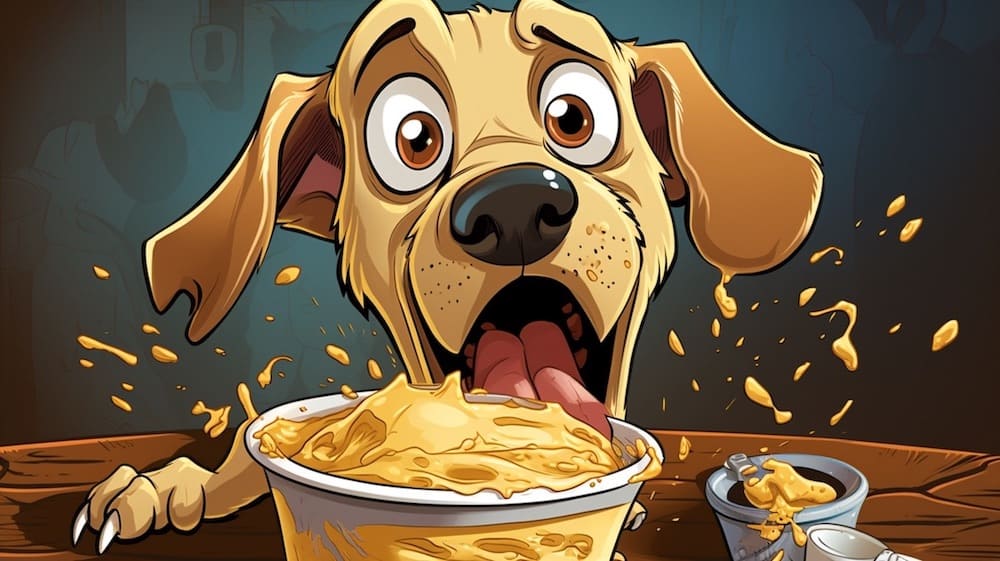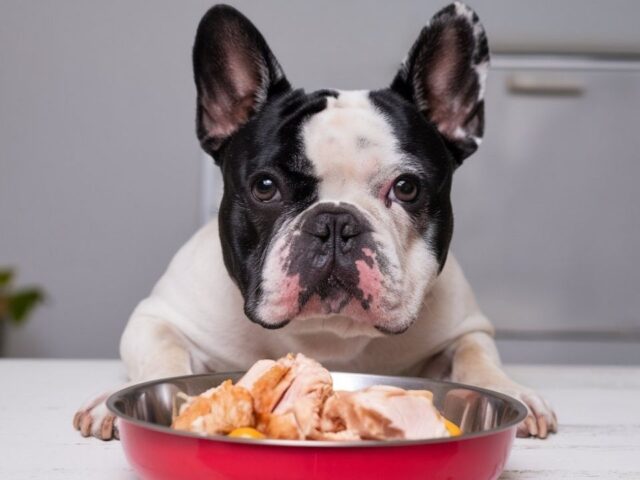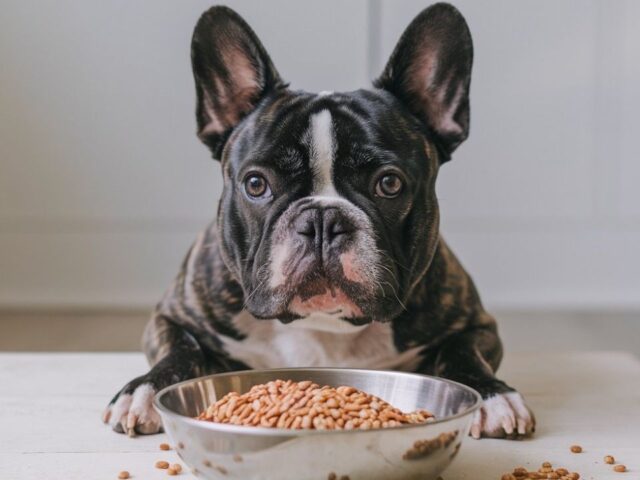Can dogs eat peanut butter? The answer is yes, but with some precautions. Most peanut butter is safe for dogs to eat, as it is a good source of protein, healthy fats, and vitamins. However, it is important to choose unsalted peanut butter, dog-specific peanut butter, or homemade peanut butter to avoid high sodium levels and extra additives.
Feeding peanut butter in moderation is essential to prevent obesity and other health complications. It is recommended to follow the 10 percent rule – treats should not make up more than 10 percent of a dog’s diet. Additionally, it is crucial to check the label for xylitol, a sugar substitute that is toxic to dogs.
Xylitol consumption can cause a rapid decrease in blood sugar levels and can be life-threatening. Owners should be aware of the symptoms of xylitol poisoning and seek veterinary help immediately if ingestion occurs. Overall, dogs can enjoy peanut butter in moderation and as long as it does not contain xylitol.
Table of Contents
- 1. Key Takeaways
- 2. Is Peanut Butter Safe for Dogs?
- 3. Feeding Peanut Butter to Dog in Moderation
- 4. Additional Tips for Feeding Peanut Butter to Dogs
- 5. Homemade Peanut Butter for Dogs
- 6. Signs of Xylitol Poisoning in Dogs
- 7. Final Thoughts on “Can Dogs Eat Peanut Butter?”
- 8. FAQ on “Can Dogs Eat Peanut Butter?”
Key Takeaways
- Most peanut butter is safe for dogs to eat but choose unsalted peanut butter, dog-specific peanut butter, or homemade peanut butter.
- Always feed peanut butter in moderation to prevent obesity and health complications, following the 10 percent rule.
- Check the label for xylitol, which is toxic to dogs and can cause life-threatening symptoms if consumed.
- Be aware of the symptoms of xylitol poisoning and seek veterinary help immediately if ingestion occurs.
Is Peanut Butter Safe for Dogs?

Most peanut butter is safe for dogs to eat, as it is a good source of protein, healthy fats, and vitamins. However, it is important to keep in mind the potential risks of feeding peanut butter to dogs.
When selecting peanut butter for your furry friend, it is best to choose unsalted peanut butter, dog-specific peanut butter, or homemade peanut butter to avoid high sodium levels and extra additives.
It is also crucial to check the label for xylitol, a sugar substitute that is toxic to dogs. Even small amounts of xylitol consumption can cause a rapid decrease in blood sugar levels and can be life-threatening.
Feeding peanut butter in moderation is essential to prevent obesity and other health complications. The 10 percent rule, where treats should not make up more than 10 percent of a dog’s diet, is recommended.
Owners should also monitor their dog’s reaction to peanut butter and make sure it does not cause any digestive issues or allergic reactions.
If ingestion of xylitol occurs, owners should be aware of the symptoms of xylitol poisoning, which include vomiting, loss of coordination, seizures, and in severe cases, liver failure. Seeking veterinary help immediately is crucial.
Overall, dogs can enjoy peanut butter in moderation and as long as it does not contain xylitol. By following these tips, owners can safely incorporate this tasty treat into their dog’s diet.
Feeding Peanut Butter to Dog in Moderation

Feeding peanut butter to dogs is a popular practice, but it is important to do it in moderation. Feeding too much peanut butter to a dog can lead to obesity and other health complications. To prevent this, it is recommended to follow the 10 percent rule – treats should not make up more than 10 percent of a dog’s diet.
It is also essential to choose the right type of peanut butter. Opt for unsalted peanut butter, dog-specific peanut butter, or homemade peanut butter to avoid high sodium levels and extra additives. Homemade peanut butter is a good choice as it allows you to control the ingredients and ensure that there are no harmful additives.
When feeding peanut butter to dogs, it is crucial to check the label for xylitol, a sugar substitute that is toxic to dogs. Xylitol consumption can cause a rapid decrease in blood sugar levels and can be life-threatening. To prevent xylitol poisoning, always check the label before feeding peanut butter to your dog.
In conclusion, feeding peanut butter to dogs can be a healthy and enjoyable treat as long as it is done in moderation and as long as it does not contain xylitol. By following these guidelines, you can ensure that your dog enjoys peanut butter safely while also maintaining a healthy diet.
Additional Tips for Feeding Peanut Butter to Dogs
Here are some additional tips for safely feeding peanut butter to your furry friend:
- Use peanut butter as a treat or for stuffing interactive toys, such as a Kong.
- Always check the label for any potential allergens, such as peanuts or soy.
- Monitor your dog’s reaction to peanut butter, especially if it is their first time trying it.
- Avoid feeding your dog peanut butter in excessive amounts, as it can lead to obesity and other health complications.
- Consider making your own peanut butter at home, using only dog-friendly ingredients.
By following these dos and don’ts, you can safely and responsibly feed peanut butter to your dog as a tasty treat. Remember, every dog is different, so it is always important to consult with your veterinarian for personalized advice on feeding peanut butter to your dog.
Homemade Peanut Butter for Dogs

Making homemade peanut butter for dogs is a great way to ensure the quality of the ingredients and avoid potential harmful additives. Plus, it’s relatively easy to make and can save money in the long run. Here’s a simple recipe for dog-friendly peanut butter:
Ingredients:
- 2 cups unsalted, roasted peanuts
- 1 tablespoon honey (optional)
- 1 tablespoon coconut oil (optional)
Instructions:
- Place the peanuts in a food processor or blender.
- Pulse the processor or blend the peanuts until they form a crumbly texture.
- Continue processing the peanuts until the texture becomes smoother, scraping down the sides of the bowl as necessary.
- Add honey and coconut oil, if desired, and process until well combined.
- Store the peanut butter in an airtight container in the refrigerator for up to 2 weeks.
When feeding homemade peanut butter to dogs, it is still important to keep moderation in mind. Additionally, owners should be aware of any potential allergens in the ingredients and monitor their dog’s reaction to the peanut butter. With these precautions in place, homemade peanut butter can be a healthy and tasty treat for dogs.
Signs of Xylitol Poisoning in Dogs
Owners should be aware of the potential dangers of xylitol, a sugar substitute that is commonly found in sugar-free gum, candy, and some peanut butter brands. Xylitol consumption can cause a rapid decrease in blood sugar levels, leading to seizures, loss of coordination, and even liver failure. It is crucial for pet owners to recognize the signs of xylitol poisoning and take immediate action if ingestion occurs.
The symptoms of Xylitol poisoning in dogs may include:
- Vomiting
- Loss of coordination
- Weakness
- Seizures
- Difficulty breathing
- Coma
If your dog exhibits any of these symptoms after ingesting xylitol, it is important to seek veterinary help immediately. Time is of the essence when it comes to treating xylitol poisoning, as the condition can become life-threatening if left untreated.
Prevention is key when it comes to Xylitol poisoning in dogs. Always check the label of any product before giving it to your dog, and avoid feeding them any human food that contains Xylitol. If you do choose to feed your dog peanut butter, make sure it is xylitol-free and fed in moderation.
Final Thoughts on “Can Dogs Eat Peanut Butter?”
Overall, dogs can enjoy peanut butter in moderation and as long as it does not contain xylitol. It is a good source of protein, healthy fats, and vitamins. However, it is important to choose unsalted peanut butter, dog-specific peanut butter, or homemade peanut butter to avoid high sodium levels and extra additives.
Feeding peanut butter in moderation is essential to prevent obesity and other health complications. It is recommended to follow the 10 percent rule – treats should not make up more than 10 percent of a dog’s diet. Additionally, checking the label for xylitol, a sugar substitute that is toxic to dogs, is crucial.
Xylitol consumption can cause a rapid decrease in blood sugar levels and can be life-threatening. Therefore, it is important to be aware of the symptoms of xylitol poisoning and seek veterinary help immediately if ingestion occurs.
In conclusion, peanut butter can be a tasty treat for dogs, but it is crucial to feed it in moderation and choose safe and healthy options. Owners should consult with their veterinarian for personalized advice on feeding peanut butter to their dogs and always monitor their pet’s reaction to it.
FAQ on “Can Dogs Eat Peanut Butter?”
Yes, dogs can eat peanut butter, but with some precautions.
It is important to choose unsalted peanut butter, dog-specific peanut butter, or homemade peanut butter to avoid high sodium levels and extra additives.
Feeding peanut butter in moderation is essential. Treats should not make up more than 10 percent of a dog’s diet.
Yes, you can make homemade peanut butter for dogs. It allows you to control the ingredients and avoid potential harmful additives.
The symptoms of Xylitol poisoning in dogs include vomiting, loss of coordination, seizures, and a rapid decrease in blood sugar levels. It is crucial to seek veterinary help immediately if ingestion occurs.
Yes, dogs can enjoy peanut butter as a treat. It is important to use it in moderation and choose peanut butter without xylitol.
Some tips for safely feeding peanut butter to dogs include using it as a treat or for stuffing interactive toys, checking the label for any potential allergens, and always monitoring the dog’s reaction to peanut butter.
More Related Stories:









